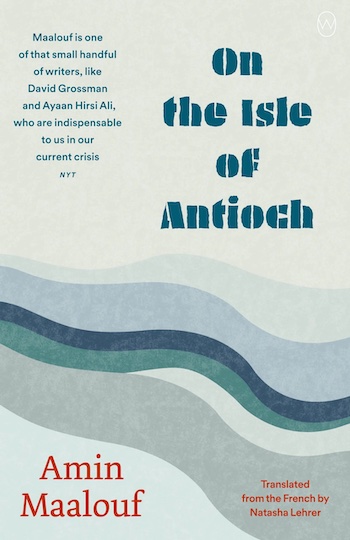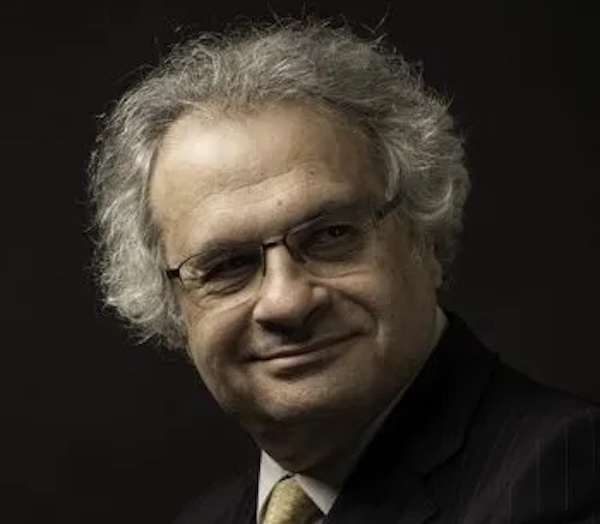Book Review: “On the Isle of Antioch” — It is Believable? Does it Matter?
By David Mehegan
If this is a fable, is there a moral? Nothing simple is asserted, but the point clearly is that mankind is rushing pell-mell to its doom and the only thing that can save it is an intervention that comes, not from the outside, but from something good hidden within.
On the Isle of Antioch by Amin Maalouf. Translated from the French by Natasha Lehrer. World Editions. 279 pp. Paper. $18.99.

On the Isle of Antioch was written to raise an alarm about the breakneck skid toward disaster in which the author sees humankind headed. It is, the publisher announces inside the front cover, “a dystopia, a genre in which Amin Maalouf has never written before. And yet, here, his warning call for an awakening grows even louder as he uses elements of philosophy, science fiction, and romance to warn of political and ecological collapse. … This new novel will leave readers knowing with all their hearts that change is vital.”
When a publisher announces that a novel is written because the author “understands that often fiction enters the minds of readers more effectively than facts,” we are put on notice that art-making is a motivation secondary to influence and that we are reading more parable, or fable, than novel.
Lebanese-born Amin Maalouf writes in French, although his first language was Arabic. He has lived in France in 1976 and since then has published many works of fiction and nonfiction, as well as a memoir, Origins. A past winner of the Prix Goncourt, he is a member of the French Academy. Thirteen of his previous books are available in English.
Set in the present, the story occupies one month and is told in the form of dated journal entries by Alexandre, a Montreal-born syndicated cartoonist who lives and works alone on a small island called Antioch on the French Atlantic coast. No last name is given: he draws under the nom de plume “Alec Zander.” The island has one other inhabitant, a misanthropic French novelist, Eve Saint-Gilles.
Alec wakes up one morning to find that Internet, cell phone, and broadcast communication has been cut off and right away concludes — it is not clear why — that nuclear war has started. Fortunately for him and the plot, it just so happens that Alec’s oldest friend, Morris Oates (nicknamed Moro) is a close advisor to Howard Milton, president of the United States, and is always readily available by telephone. When phone service is mysteriously restored, Alec calls Moro on his personal phone and receives an incredibly detailed (and completely unsecured) accounting, quoted directly in the book, of what has happened. A Russian rebel warlord named Sardarov — somebody like Yevgeny Prigozhin — has set up headquarters, armed with nuclear weapons, in the Caucasus mountains. A mysterious blast has taken place in Maryland, which has killed several hundred people. It is not clear that it was a nuclear explosion — the reader will ponder how that could not be clear — but we are to understand that it could not have been anything else. President Milton is on his way to a diplomatic visit, with Moro in his party, to Chile and has decided to order a nuclear strike on Sardarov to prevent anticipated further mischief. But when he lands in Chile, all communications have been mysteriously cut off and his order cannot be carried out. Sardarov cannot act for the same reason.
It turns out that an up-to-now hidden segment of humankind, the philosophical descendants of the pre-Socratic philosopher Empedocles, has maintained itself since the time of the Greek republic. Empedocles, believed by some to be divine, held a dualistic vision of reality, in contrast with the unitary vision of Parmenides. He taught a philosophy of struggle between love and strife. According to legend, in 430 B.C.E. he died by jumping into the caldera of Mt. Etna, the Sicilian volcano, to prove that he was a god. It seems the proof did not work out.
When these Friends of Empedocles, as they call themselves, see that humankind is about to incinerate itself with nukes, they come out of wherever they have been hanging out for millennia and shut off the power. See, they have accumulated advanced scientific and medical knowledge, and now they are going to save the rest of us from ourselves. Their apparent leader (though that is as unclear as everything else), named Demosthenes, explains everything to Howard Newton, and Moro passes all the details by telephone to his friend Alec, who somehow manages to quote Moro directly and completely in his journal.
Meanwhile, it just so happens that one of the Friends of Empedocles, named Agamemnon (they all have Greek names), is living on the island of Antioch, disguised as a ferry operator. Furthermore, the misanthropic novelist, Eve Saint-Gilles, had previously written a novel about Empedocles and his followers (she isn’t one of the Friends, but they know about her and cherish her novel), and when they show up she has a personality change and becomes sort of a lovable lady, so happy is she that her heroes have intervened to save us all from doom.
Remembering that the publisher used the word “dystopia” to describe this book, one expects the Friends of Empedocles to be like the alien beings in The Twilight Zone who visited earth “to serve mankind,” which turns out to mean they are preparing us for dinner. But that never happens here. After preventing nuclear war, the Friends of Empedocles send hospital ships to ports all over the world (including one to tiny Antioch, of course). Where the ships were built and how they move around undetected is one of many unexplained mysteries. The important thing is that they each have a sort of tunnel chamber and injured or diseased people who pass through it are cured of their ills — possibly even the fate of death.
As it happens, President Newton himself is suffering from terminal cancer but resists taking the cure because he fears that the Friends and their power will displace and eliminate all the legitimate governments of the earth and become a race of masters. He even tries to get other nations to forbid the ships to anchor. As Moro explains it to Alec in one of his eloquent and perfectly grammatical telephone discourses, “If people believe that someone or something — an individual, a group of people, a political party, a cult — could cure them of all their sickness and suffering and prolong their lives, they’d worship them, become their willing slaves. The person who controls the length and quality of a person’s life is, quite simply, God. Which means that this strange nation, whose existence two weeks ago we had not the slightest idea of, is on the verge of being deified…. Tomorrow, virtually every human being on earth will be bowing down to these people, calling them their lords and masters. Our entire civilization has both feet in the grave.”

Author Amin Maalouf, a past winner of the Prix Goncourt, he is a member of the French Academy. Photo: World Editions
Nevertheless the First Lady pleads with Newton to take the cure. She makes a public speech, urging the public to get him to change his mind, and he relents, taking the treatment in the floating hospital anchored in the Potomac River.
When the word gets out, millions of people all over the world start crowding the shores where these ships are tied up, clamoring to be cured of their ills. But then, a clandestine group calling themselves the New Founding Fathers bombs the ship in the Potomac, killing 88 patients and Friends aboard. Immediately, worldwide communication is cut off again and all the ships disappear over the horizon. A tremendous worldwide clamor for them to come back ensues, including a public speech by President Newton. And then…but enough plot.
If this is a fable, is there a moral? Nothing simple is asserted, but the point clearly is that mankind is rushing pell-mell to its doom and the only thing that can save it is an intervention that comes, not from the outside, but from something good hidden within. The Friends of Empedocles are not aliens, they are human — they look and talk like us. They are kind and civilized and loving and if we would only see and accept their wisdom, hope in our future could be renewed. They might be the philosopher-kings envisioned in Plato’s Republic. Eve Saint-Gilles loves this idea. But the question is whether submission to philosopher-kings, however beneficial in the short term, would be dangerous in the long as well as make us less than human. The Friends may wish us well, but they also seem to have unlimited power.
If we had to have perfect plausibility in art, we could not sit in rows before a proscenium stage, indeed could not accept the power of a Rembrandt painting or a novel. We don’t require it in The Wind in the Willows or the fables of Aesop (a mouse pulling a thorn out of a lion’s paw? C’mon, man!) or in George Orwell’s masterpiece, Animal Farm. However, while Orwell’s Nineteen-Eighty-Four is also a fable, it is hideously believable in light of the just-ended terrors of Naziism and of Stalin’s nightmare, still in full swing when the book was written in 1949.
On the Isle of Antioch is neither Aesopian nor Orwellian. Maalouf does not answer the glaring questions raised by book’s plot, though Alec himself sometimes poses them: “Who makes up that other branch of humankind? Where do they live? Where are their houses, their factories, their laboratories? How come we never suspected their existence until the beginning of the third millennium?” The characters of Winston Smith, Julia, and the evil O’Brien in Nineteen Eighty Four are fully drawn human beings, unlike the stick figures of Agamemnon, Moro, Eve Saint-Gilles, and Howard Newton. It seems there is only one real character in this novel, and that is Alec, in whose journal everybody and every action is filtered. I almost wonder if this is one of his cartoon story-lines.
I know, I know — Amin Maalouf is trying to make a serious point and I keep raising tedious objections. As the publisher tells us, Maalouf is using fiction to warn about the plight of humankind. That’s fine, but I would say that in skimping on the novelist’s art, his desired impact is diminished.
David Mehegan is the former book editor of the Boston Globe. He can be reached at djmehegan@comcast.net.
